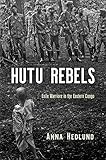Hutu Rebels : Exile Warriors in the Eastern Congo / Anna Hedlund.
Material type: TextSeries: The Ethnography of Political ViolencePublisher: Philadelphia : University of Pennsylvania Press, [2019]Copyright date: ©2020Description: 1 online resource (248 p.) : 20 illusContent type:
TextSeries: The Ethnography of Political ViolencePublisher: Philadelphia : University of Pennsylvania Press, [2019]Copyright date: ©2020Description: 1 online resource (248 p.) : 20 illusContent type: - 9780812251449
- 9780812296327
- 967.5103/4 23
- DT650.H88 H435 2020eb
- online - DeGruyter
- Issued also in print.
| Item type | Current library | Call number | URL | Status | Notes | Barcode | |
|---|---|---|---|---|---|---|---|
 eBook
eBook
|
Biblioteca "Angelicum" Pont. Univ. S.Tommaso d'Aquino Nuvola online | online - DeGruyter (Browse shelf(Opens below)) | Online access | Not for loan (Accesso limitato) | Accesso per gli utenti autorizzati / Access for authorized users | (dgr)9780812296327 |
Frontmatter -- Contents -- List of Abbreviations -- Preface -- Introduction. Conflict and Violence in the Congo -- Chapter 1. Rwandan Rebels in the Congo War: Power, Politics, and Exile -- Chapter 2. Rainbow Brigade: Life in a Rebel Camp -- Chapter 3. Politics in the Forest: Retelling History in Exile -- Chapter 4. Captivity and Commitment -- Chapter 5. The Forest of Volcanoes: Rebel-Civilian Interactions -- Chapter 6. From Bare Life to Bare Violence -- Notes -- References -- Index -- Acknowledgments
restricted access online access with authorization star
http://purl.org/coar/access_right/c_16ec
In 1994, almost one million ethnic Tutsis were killed in the genocide in Rwanda. In the aftermath of the genocide, some of the top-echelon Hutu officers who had organized the genocide fled Rwanda to the eastern Congo (DRC) and set up a new base for military operation, with the goal of retaking power in Kigali, Rwanda. More than twenty years later, these rebel forces comprise a diverse group of refugees, rebel fighters, and civilian dependents who operate from mountain areas in the Congo forests and have a long and complex history of war and violence. While media and human rights reports typically portray this rebel group as one of the most brutal rebel factions operating in the eastern Congo region, Hutu Rebels paints a more complex picture.Having conducted ethnographic fieldwork in a rebel camp located deep in the Congo forest, Anna Hedlund explores the micropolitics and practices of everyday life among a community of Hutu rebel fighters and their families, living under the harshest of conditions. She describes the Hutu fighters not only as a military unit with a vision of return to Rwanda but also as a community engaged in the present Congo conflicts. Hedlund focuses on how fighters and their families perceive their own life conditions, how they remember and articulate the events of the genocide, and why they continue to fight in what appears to be an endless conflict. Hutu Rebels argues that we need to move beyond compiling catalogs of atrocities and start examining the "ordinary life" of combatants if we want to understand the ways in which violence is expressed in the context of a most brutal conflict.
Issued also in print.
Mode of access: Internet via World Wide Web.
In English.
Description based on online resource; title from PDF title page (publisher's Web site, viewed 21. Jun 2021)


